Search
Search
News
Covid-19
Lifestyle
Lifestyle News
Hot Deals
Trending
Drama
Things To Eat
Things To Do
Stories Of Us
Celebrity
Heartwarming
Travel
Videos
Abroad
Weekend
Environment
+ More
Parliament
Perspectives
History
GE2020
CareersSearch
News
Covid-19
Lifestyle
Lifestyle News
Hot Deals
Trending
Drama
Things To Eat
Things To Do
Stories Of Us
Celebrity
Heartwarming
Travel
Videos
Abroad
Weekend
Environment
+ More
Parliament
Perspectives
History
GE2020
CareersSearch
← Back
A different kind of spiritual healing.
| ![]() January 23, 2022, 05:36 PM
January 23, 2022, 05:36 PM
![]() 15 January 2022 – 15 January 2022
15 January 2022 – 15 January 2022
![]() Online
Online
Follow us on Telegram for the latest updates: https://t.me/mothershipsg
Follow us on Telegram for the latest updates: https://t.me/mothershipsg
If it wasn’t for a giant, colourful tarpaulin, Zakti Consultancy would have been easy to miss. I have always imagined spiritual healing sites to have an esoteric feel to them, but Master Sribala’s office at 28 Hoy Fatt Road resembles a dainty mamak shop instead.
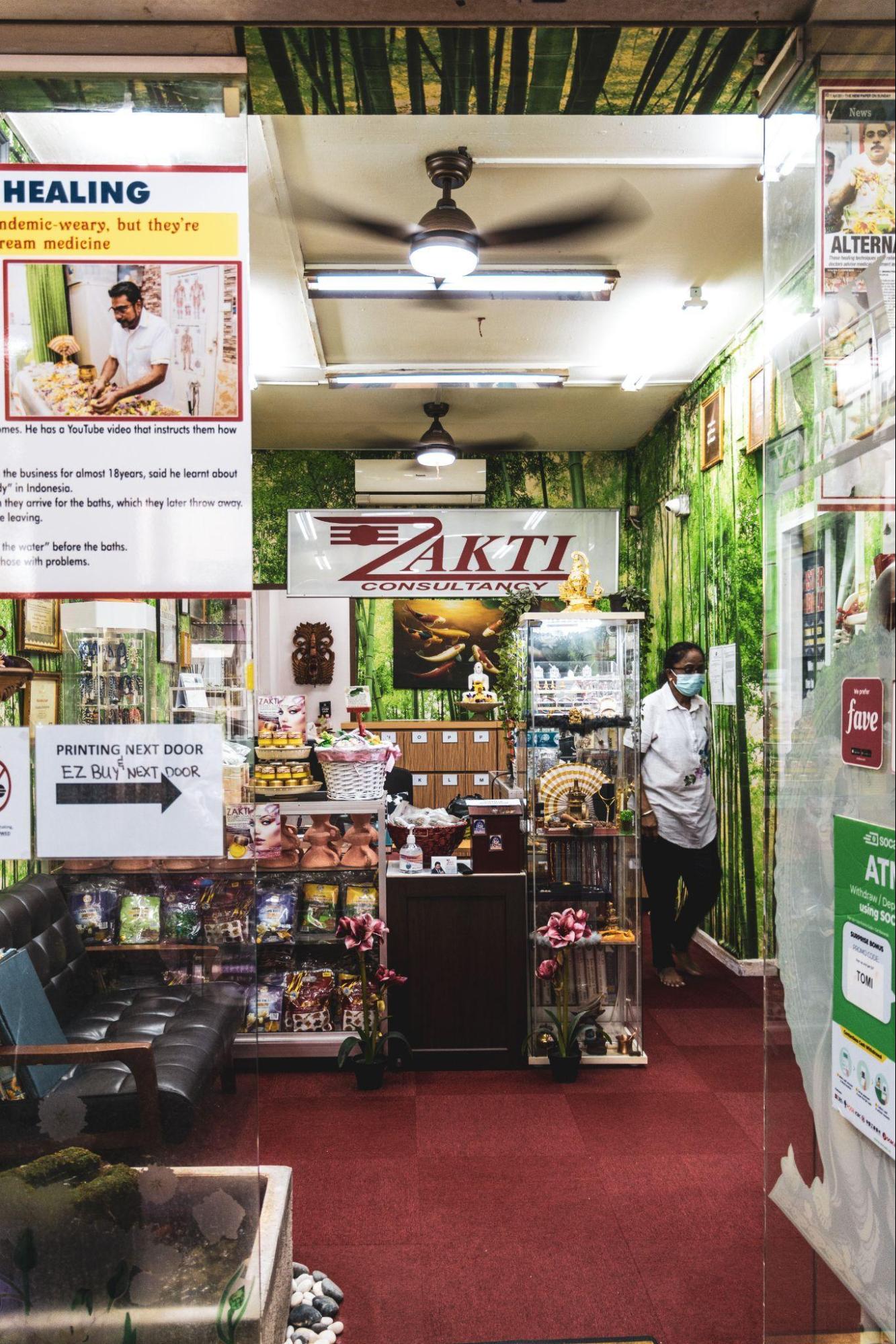 The consultancy’s interior. Photo by Marielle Descalsota
The consultancy’s interior. Photo by Marielle Descalsota 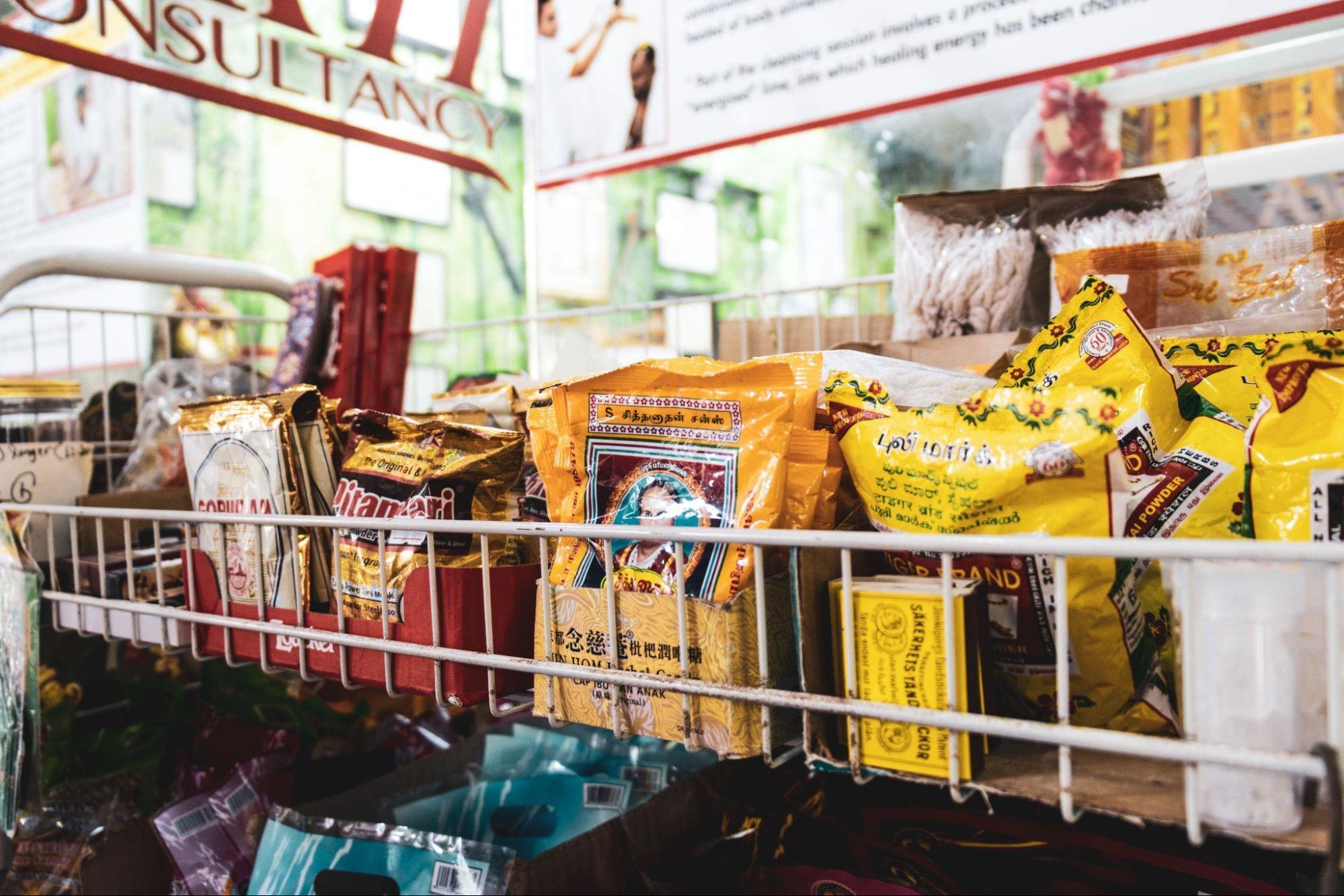 It doubles as a shop that sells things like vibhuti, a sacred ash made of cow dung, and matchsticks. Sribala says that these items facilitate Hindu prayers. Photo by Marielle Descalsota
It doubles as a shop that sells things like vibhuti, a sacred ash made of cow dung, and matchsticks. Sribala says that these items facilitate Hindu prayers. Photo by Marielle Descalsota I am here to seek his expertise in a form of alternative therapy very few healers in Singapore practise – the flower bath or mandi bunga, which is believed to get rid of bad luck and negative energy. The ritual has a long history, dating back to when animism was more commonly practised across Southeast Asia.
I recently came to know of mandi bunga and sought out Sribala to learn more about the ritual. After hearing that I was a writer, Sribala’s wife — bless her — kindly offered to let me experience the flower bath for free — in return for a frank and honest review.
It was a no brainer, really. It costs a whopping S$250 for Sribala to conduct the bath in person. There is also a take-home option (S$75) for those who want to practise social distancing but need their dose of good vibes.
Many adherents are undeterred by the price, however, swearing by the efficacy of these rituals. They not only believe in the power of the practice but the practitioner. Sribala says he conducts up to 22 baths a day and has amassed a considerable following over his 18 years in business.
While he promises that the bath would “bring out my inner glow” and “improve my aura”, he says there is one important condition for it to work.
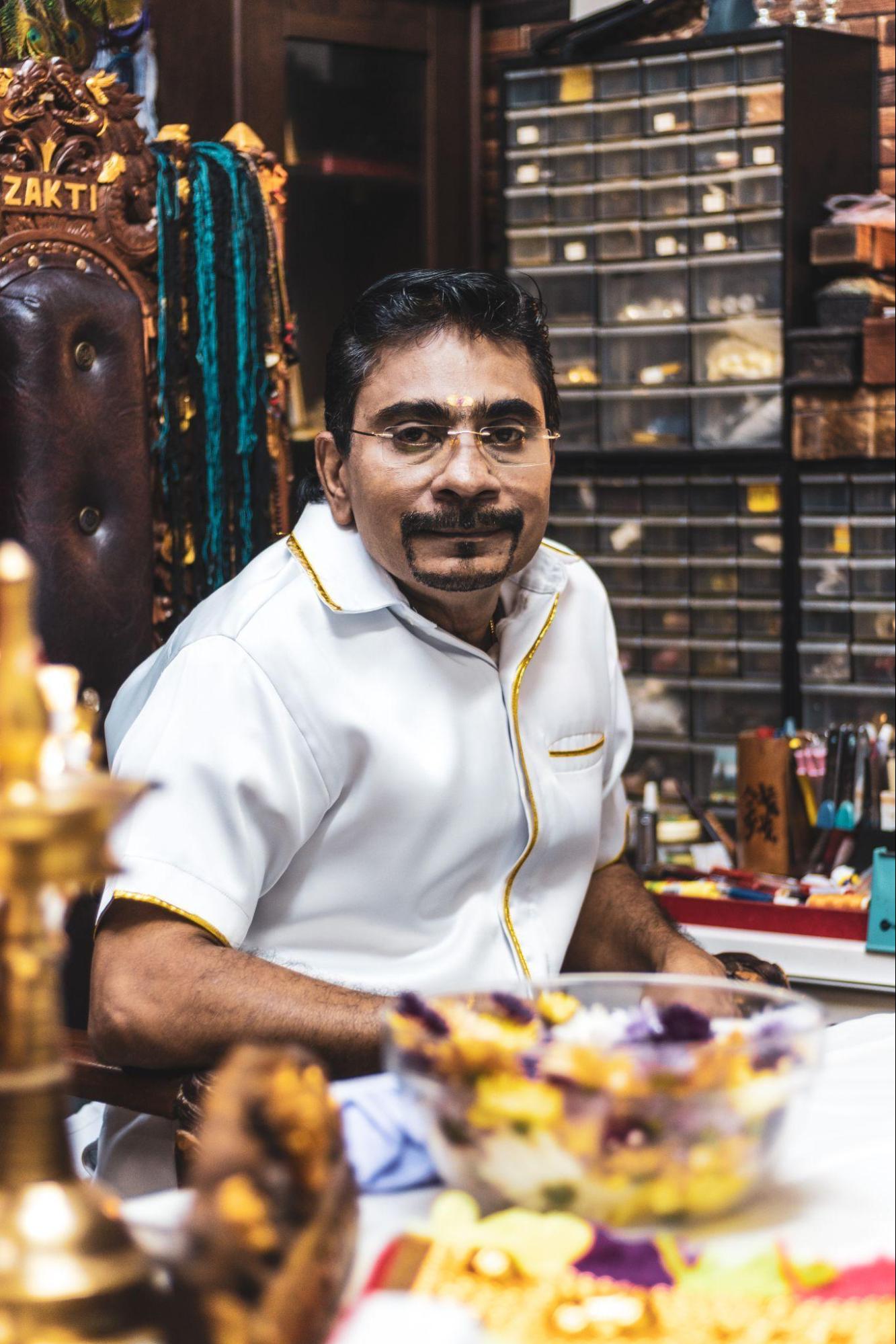 Master Sribala. Photo by Marielle Descalsota
Master Sribala. Photo by Marielle Descalsota “You need to believe,” he says. “If you think it’s not real, you will definitely never see the results.”
And it appears that many people are willing to believe.
Since the start of the pandemic in early 2020, Singaporeans have been showing more interest in spiritual healing. Methods like reiki, a Japanese “palm healing” technique that is said to reduce stress and fatigue, and mandi bunga, have seen an increase in web searches.
In the last five years, web searches for mandi bunga peaked in August 2020, scoring 100 on the Google Trends interest scale. Like Sribala, spiritual healers have also begun advertising their services online, especially as more people seek alternative therapies to treat their mental health issues.
One believer of mandi bunga I spoke to said he was only relieved from a seven-year-long struggle with anxiety after attending his first alternative healing session.
“It was like my life finally had guidance,” he said. “Words are not enough to show gratitude [to my spiritual healer].”
Encouraged by that believer’s anecdote, I put my faith (or is it fate?) in Sribala and follow him into the unknown… which in this case is a small consultation room filled with trinkets, amulets, photographs, a fish tank, and — strangely — CCTV monitors.
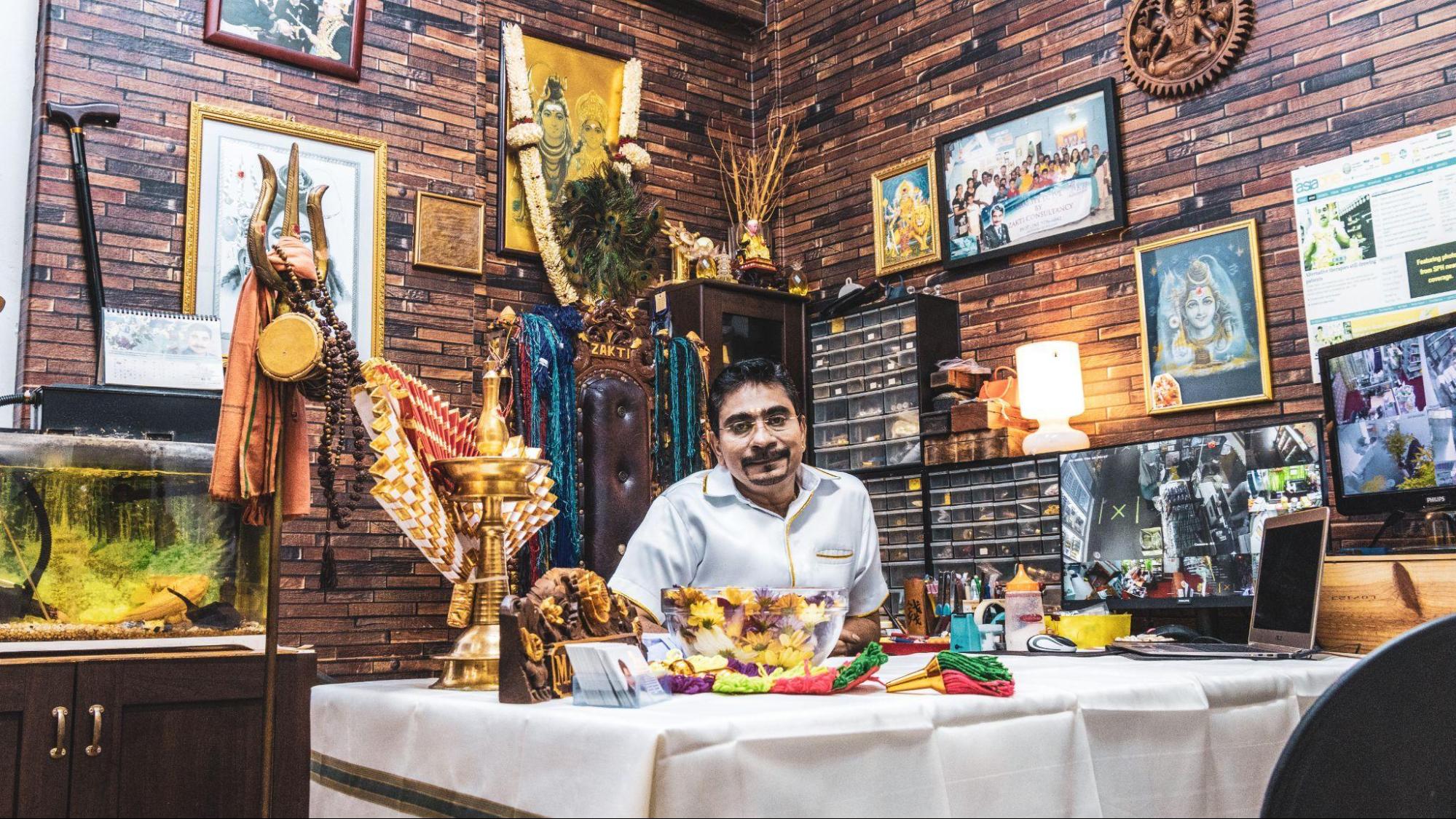 Sribala in his office. Photo by Marielle Descalsota
Sribala in his office. Photo by Marielle Descalsota 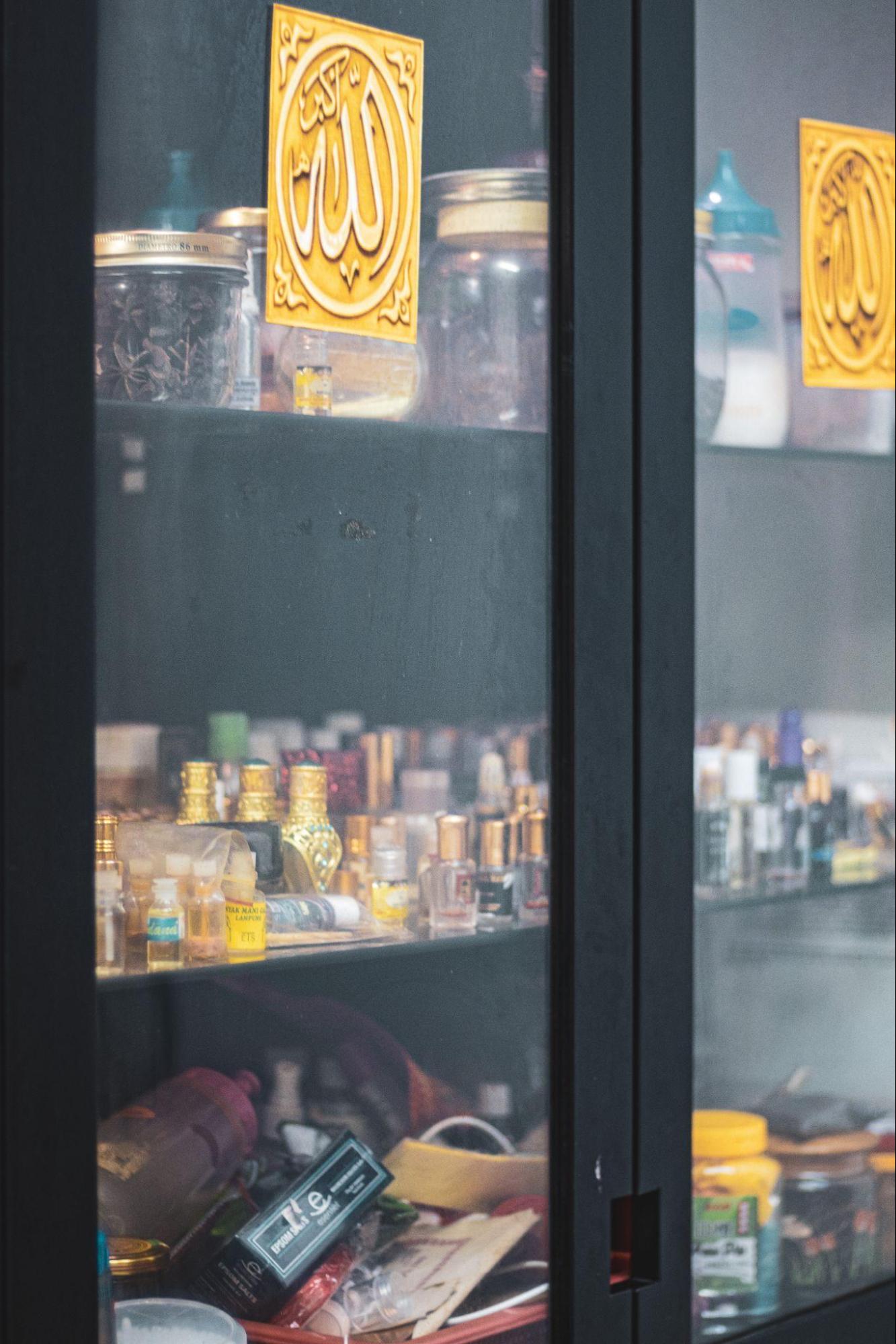
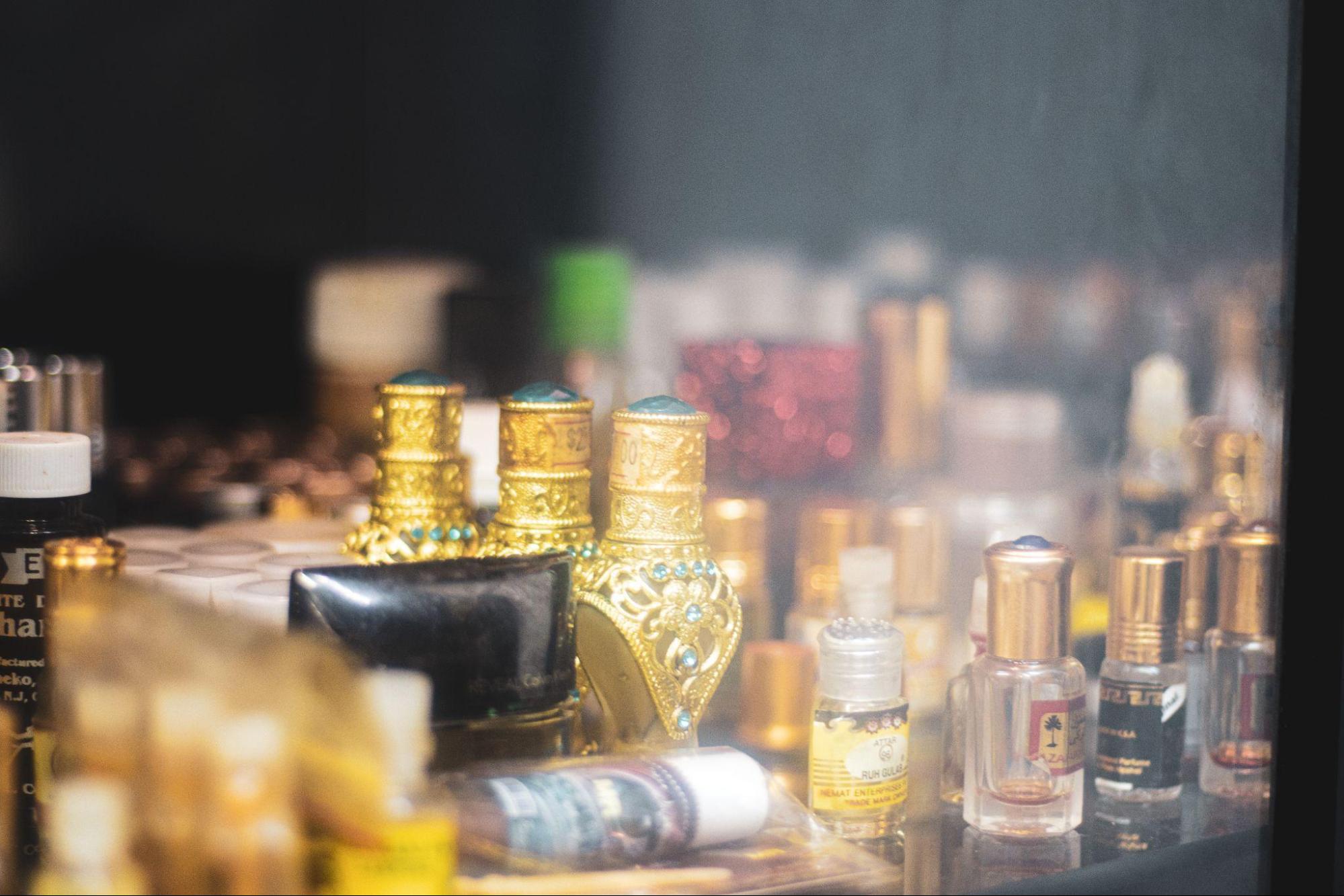 His cabinets are filled with items that he believes can increase one’s attractiveness, like love oils and epsom salt. Photo by Marielle Descalsota
His cabinets are filled with items that he believes can increase one’s attractiveness, like love oils and epsom salt. Photo by Marielle Descalsota The eclectic space is a sharp contrast to Sribala’s crisp, almost uniform-like outfit of a white shirt and black trousers. Here he begins the consultation, where he explains how he started performing these healing rituals.
Sribala, who was born Srikanthan Balakrishnan, says that spiritual healing is like a calling to him, a family trade that can be traced to his grandfather.
“I was in the Air Force when I received my spiritual calling. I spent six years in Kerala, India and I soon began doing therapy for people who have ailments like frozen shoulders,” says the 55-year-old, who founded his consultancy in 1996.
“I then learned how to perform flower baths in Indonesia, from an old lady who treated me like her son.”
“I then learned how to perform flower baths in Indonesia, from an old lady who treated me like her son.”
The practice of ritualistic bathing in flower and lime first started with shamans from places like the Malay Peninsula, who diagnosed illnesses and chose appropriate spells to cure the afflicted. Traditionally, the baths are conducted in the morning, as it is believed that positive energy is highest at this time of the day.
Sribala conducts his baths with Hindu mantras, although traditionally, flower baths are also performed with Islamic prayers and even chants that enact spells.
Like the shamans before him, Sribala claims that the bath is so powerful that it can “fix many issues”, from seemingly trivial matters like disagreements with colleagues to heart-wrenching troubles like divorce.
He says that he has a clientele of some 8,000 people from around the world, many of whom write testimonials which he compiles in photo albums.
“I have helped people who go through sleepless and restless nights from something deep inside that disturbs them. They feel a lot of anger from people who have betrayed them. They believed in the bath and saw a lot of changes in their life.
I have not seen clients walking in and telling me nothing happened. I do the best I can to solve their issues.”
“I have helped people who go through sleepless and restless nights from something deep inside that disturbs them. They feel a lot of anger from people who have betrayed them. They believed in the bath and saw a lot of changes in their life.
I have not seen clients walking in and telling me nothing happened. I do the best I can to solve their issues.”
When I ask him what else the flower bath could do for me, his answer leaves me speechless.
“You have evil eyes on you – there are people who are jealous of you,” he says, referring to the belief that a cursed stare causes bad luck. “The bath will help protect you from them.”
While I have yet to experience any misfortune from the malevolent force of an evil eye (or so I think), it is better to be safe than sorry — I welcome all the protection the bath could offer.
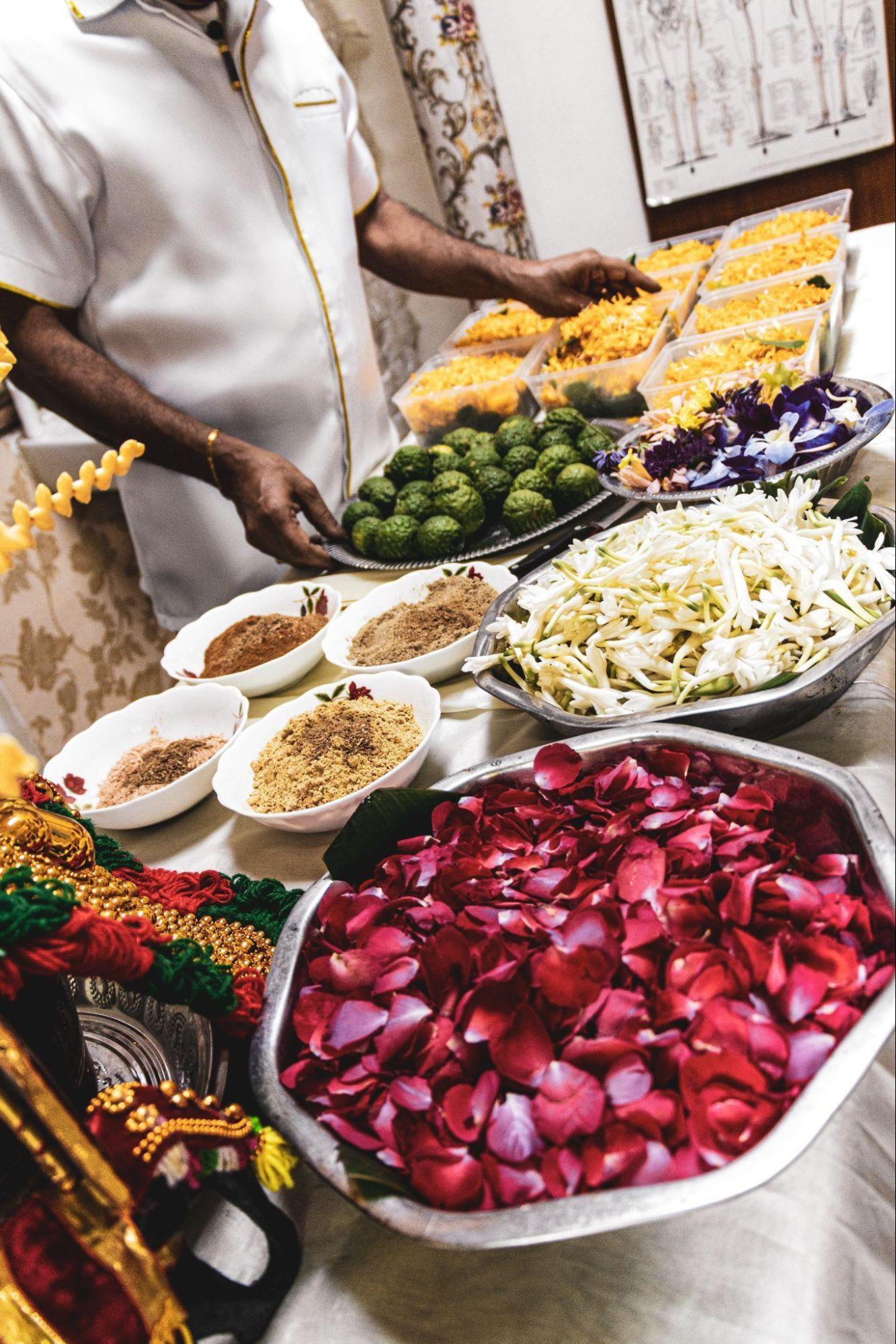 The bath’s full recipe remains a secret. Photo by Marielle Descalsota
The bath’s full recipe remains a secret. Photo by Marielle Descalsota After the consultation, Sribala leads me into another room with various ingredients laid out on a table. Like his office, the space is quite eccentric – charts of the human anatomy are displayed on the walls while towels and packets of tissues line the shelves. 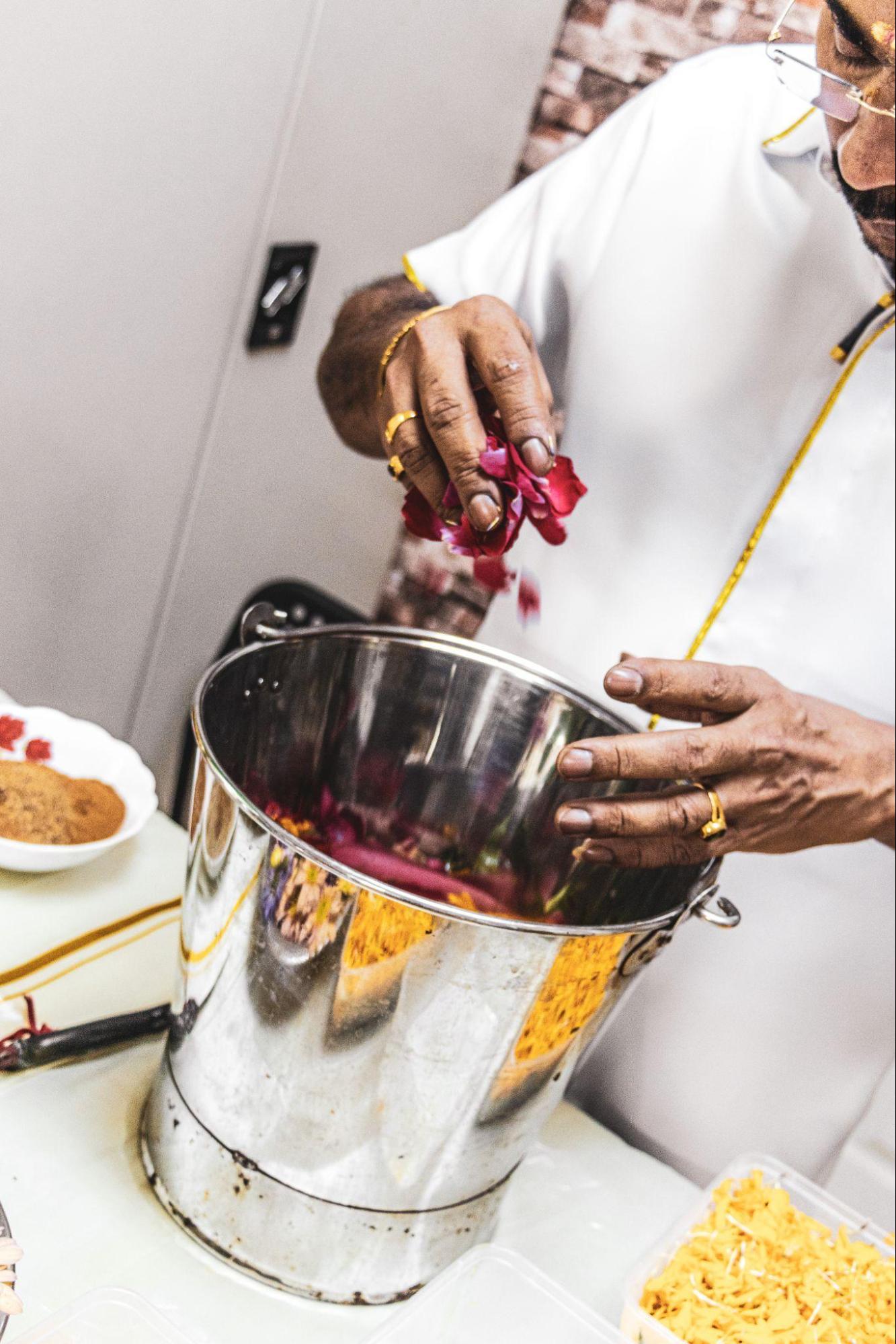
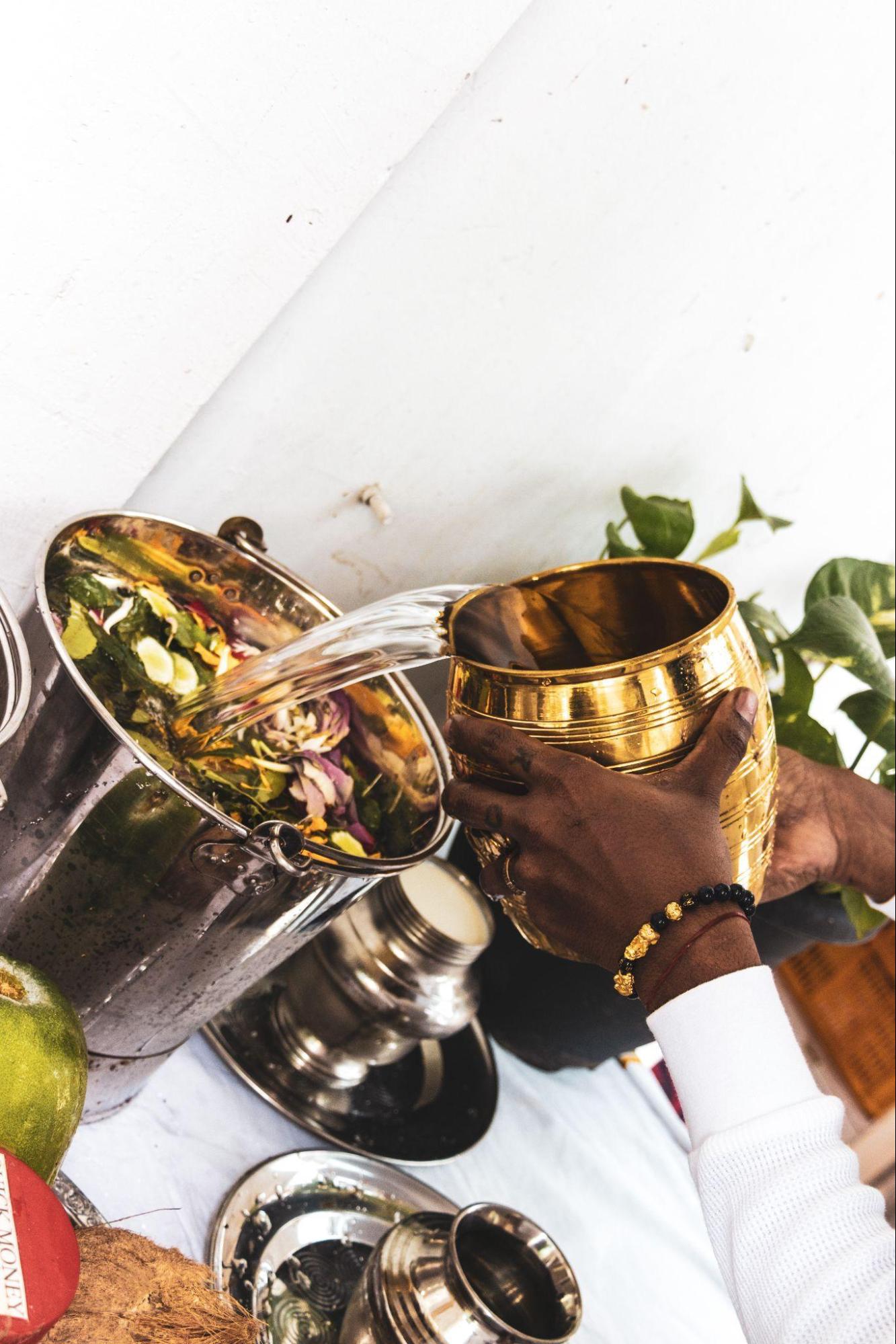 Sribala preparing the bath. Photo by Marielle Descalsota
Sribala preparing the bath. Photo by Marielle Descalsota Here he concocts the bath, which consists of a blend of spices, flowers like rose and orchid, and kaffir lime, among other ingredients he keeps secret. He then mixes them in a pail before adding water from a small gold bucket. 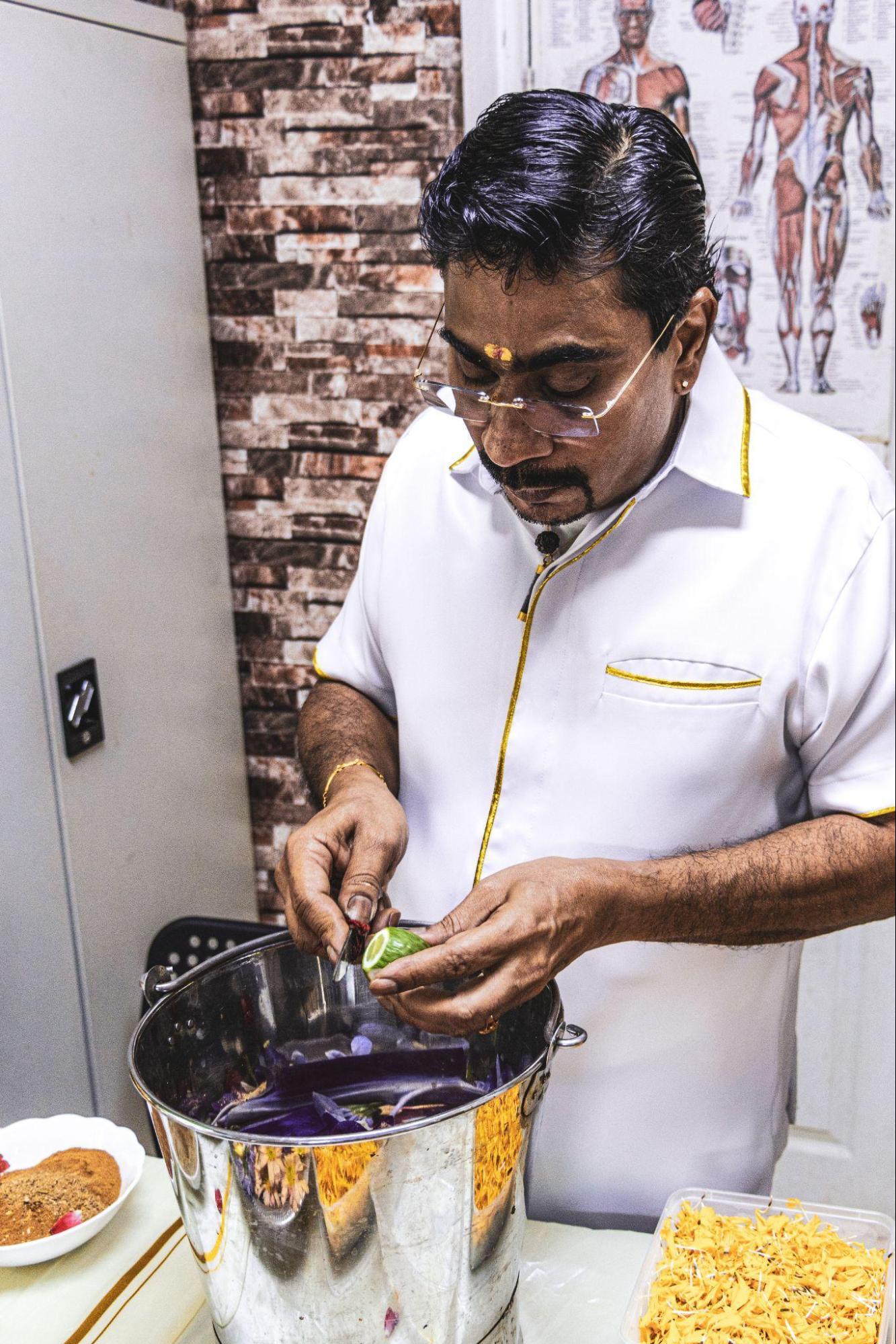
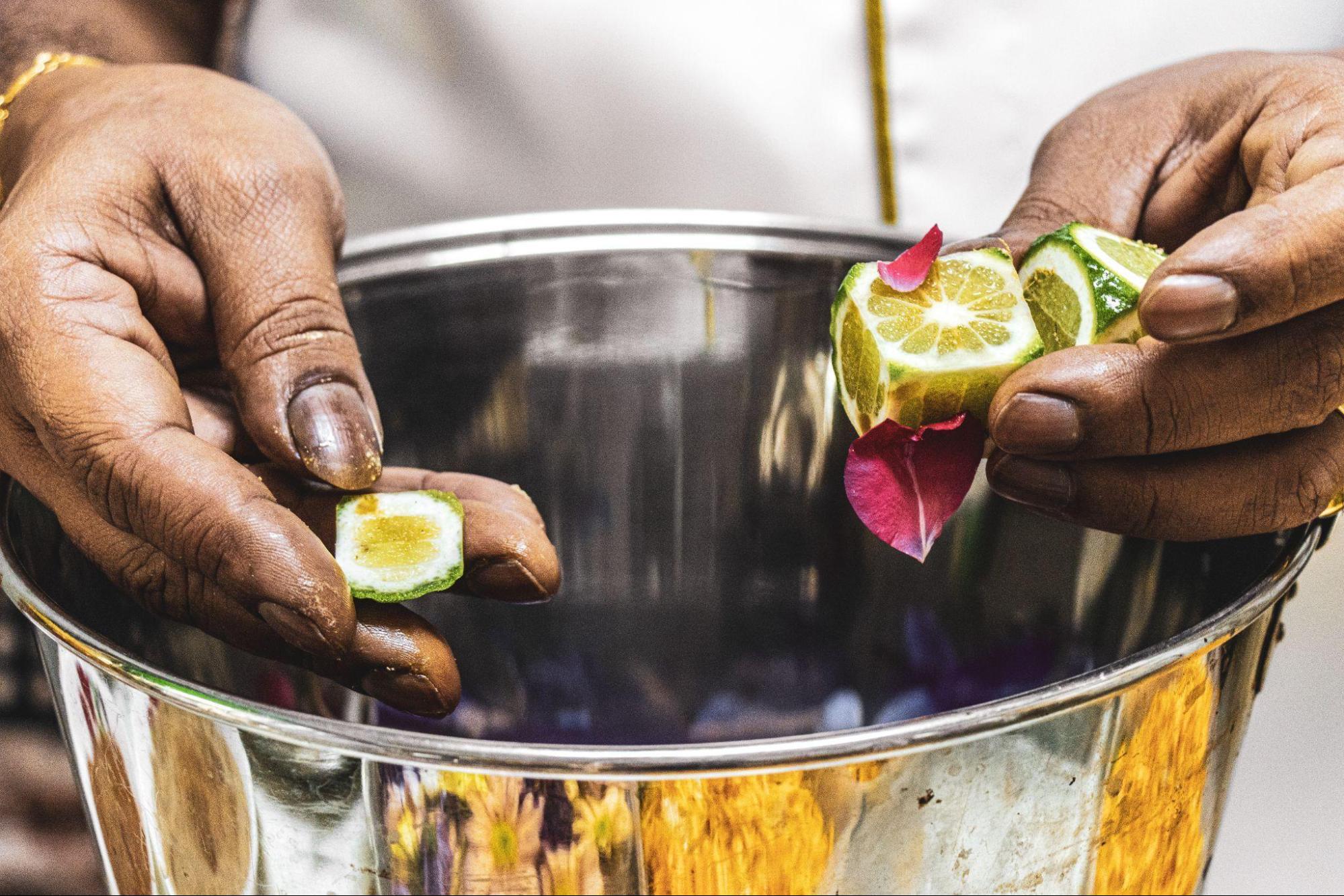 The marks on a kaffir lime. Photo by Marielle Descalsota
The marks on a kaffir lime. Photo by Marielle Descalsota According to Sribala, the kaffir limes indicate where a person needs healing. In my case, the marks on the fruit reveal that I have a shoulder ache which, honestly, I wasn’t aware of until he pointed it out.
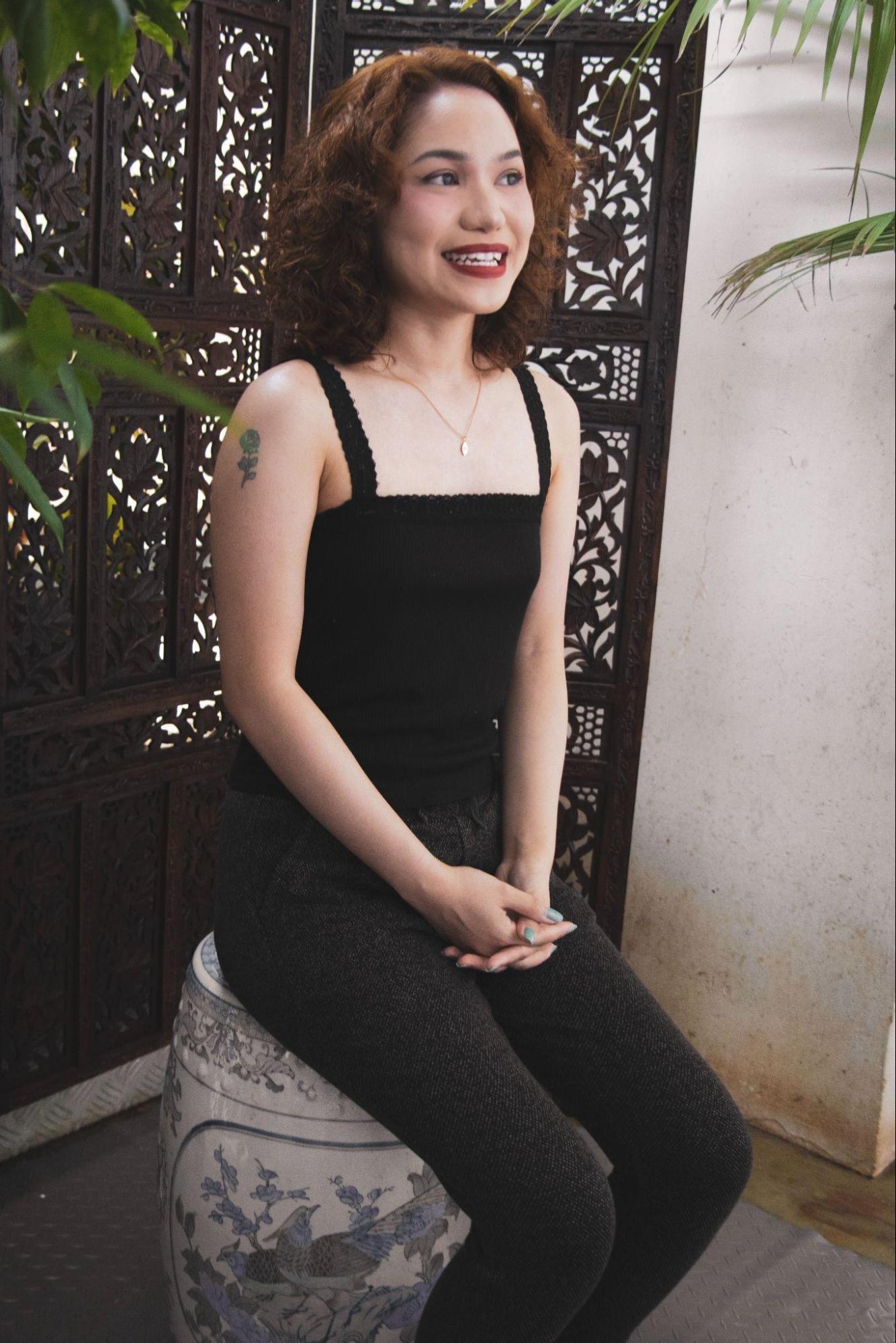 Trying to get into a positive trance. Photo by Marielle Descalsota
Trying to get into a positive trance. Photo by Marielle Descalsota As I take my place on a porcelain stool at the back of the building, I recall the rules I need to follow for the bath to work:
- Clothes used in the bath must be thrown away
- No pork, beef, and alcohol on the day of the bath
- Think about positive things or say prayers during the bath
- Do not look back when leaving the bath space
- Do not shower for four to five hours after the bath
Seems simple enough, right?
 A bit of fire is involved before the bath. Photo by Marielle Descalsota
A bit of fire is involved before the bath. Photo by Marielle Descalsota 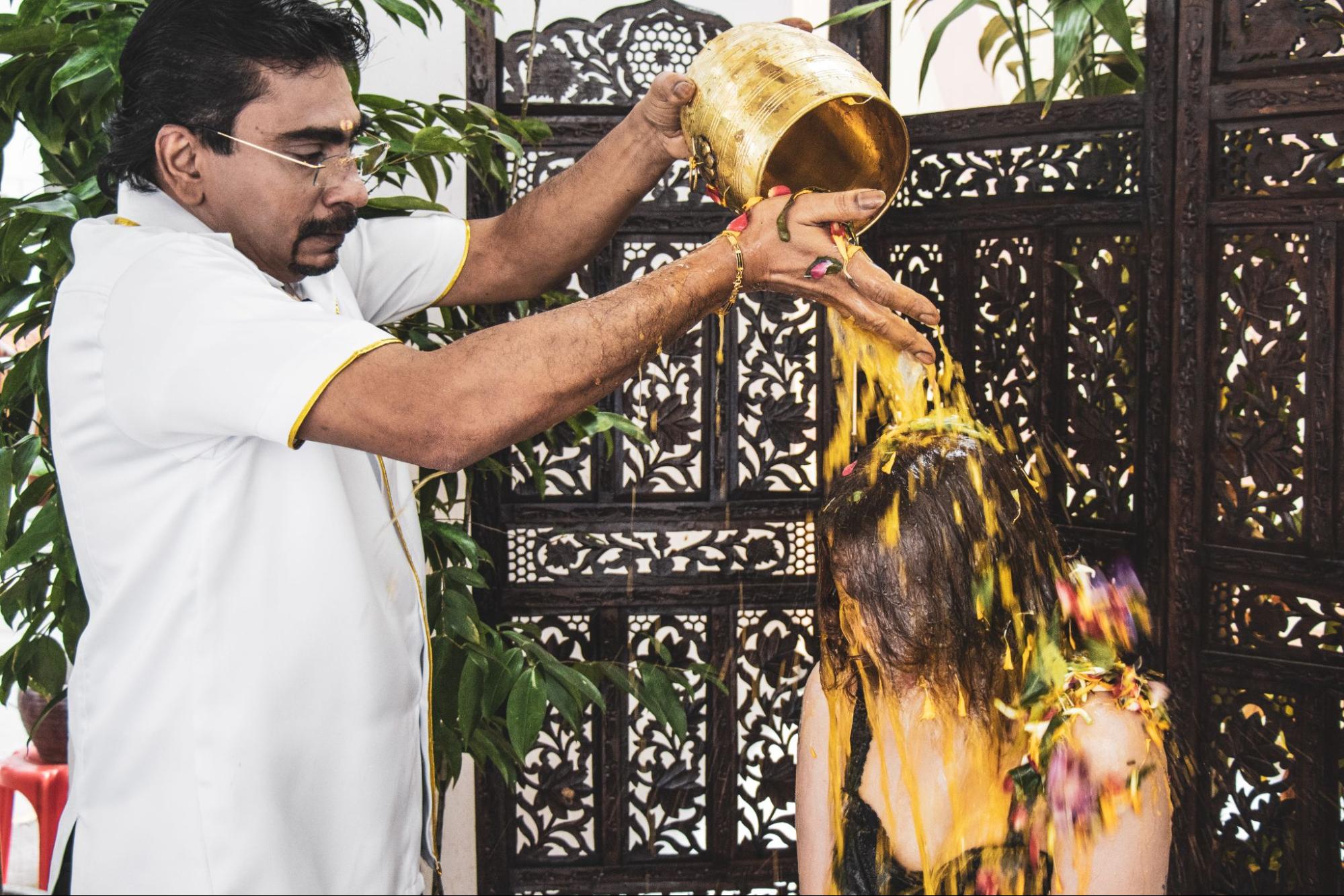 It felt longer than five minutes. Photo by Marielle Descalsota
It felt longer than five minutes. Photo by Marielle Descalsota But I end up breaking rule number three as the cold water splashes against my bare skin. I try fighting the urge to mutter obscenities as I realise that one of the ingredients in the bath is salt, which stings as it gets to a cut above my eye. The pain thankfully fades as the bath progresses.
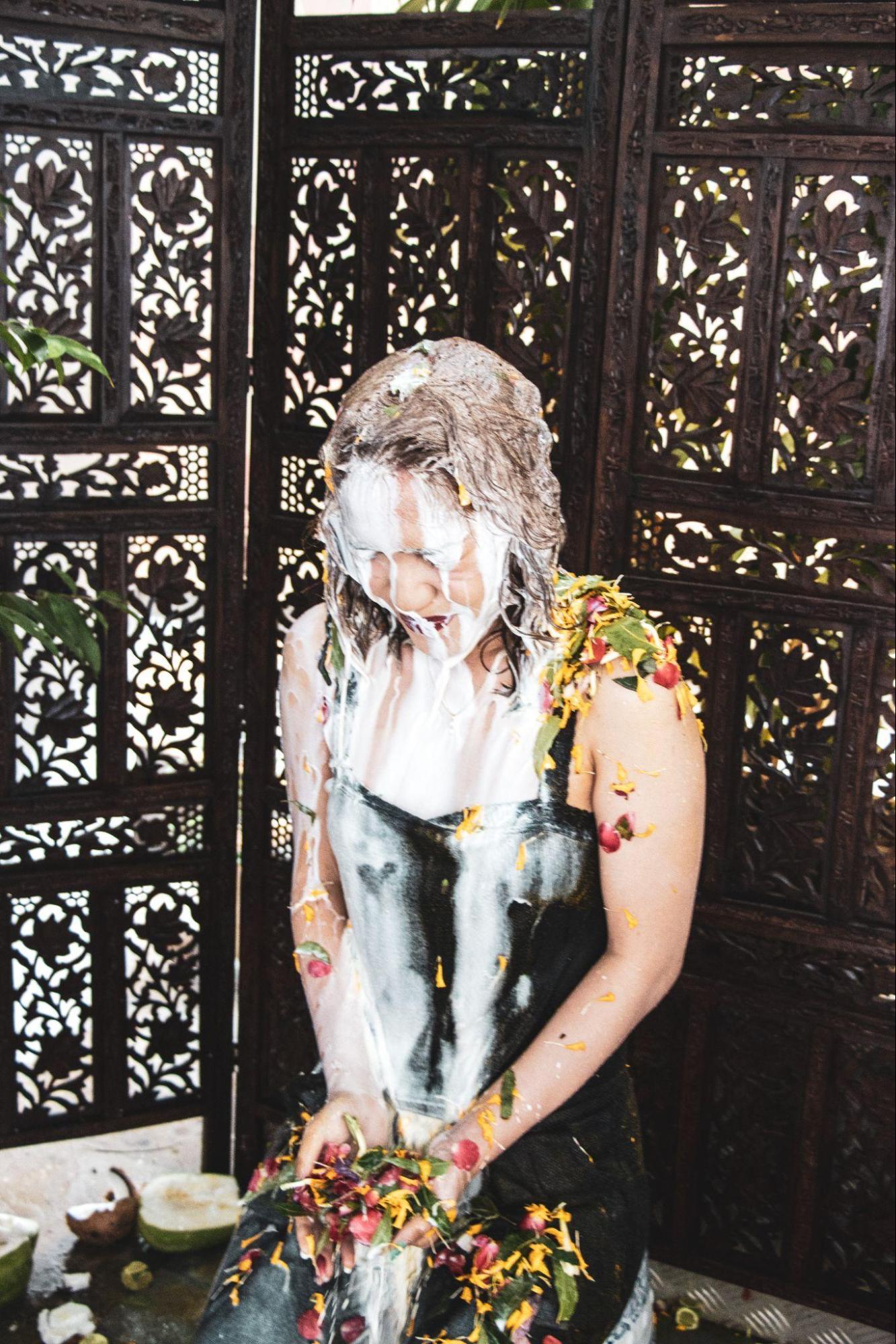 Covered in milk. Photo by Marielle Descalsota
Covered in milk. Photo by Marielle Descalsota Sribala then pours a whole carton of milk, which symbolises purity, over me. The liquid, which should come from a cow for the purposes of the ritual, has a special significance in Hinduism.
To end the bath, he presses a handful of flowers into my palms while instructing me to throw them over my shoulder, which would rid my body of negative energy.
While I feel refreshed after the ritual, cleaning up is a nightmare, thanks to Sribala’s not-so-secret-spice in the bath: Turmeric.
My whole body is covered in yellow powder and the changing room flooded with the amber-coloured liquid. Everything from my scalp to my nails is stained yellow – I try to make myself feel better by thinking of it as a halo of positive vibes or a bright aura. But it’s a bit hard when flowers and leaves are also clinging stubbornly onto my hair.
While on the train home, I realise with growing dismay that bits of caked yellow powder are sticking to my seat. It looks as if I was caught in a sandstorm. I follow Sribala’s advice and shower only late at night, but alas, it takes me several days to fully remove the turmeric stains.
Positive results
In the following week, I asked family and friends if I seemed any different, if they could spot changes in my aura, or if I looked extra radiant… and all I got was a resounding “NO”.
While my experience was not as significant as that of Sribala’s longtime patrons (some were apparently cured of nagging maladies like broken relationships and unemployment) there were good things that came out of the mandi bunga for me too.
Although I felt pretty bummed that the flower bath fell short of completely changing the vibes I give off, I found myself trying to be more optimistic in the weeks following the ritual. I used to be bothered by minor inconveniences like slow traffic and long queues at my favourite hawker stall, but now I remind myself to be mindful of my thoughts, especially negative ones.
Now hear me out – I know the price is steep and most will find it hard to swallow. But after experiencing the ritual myself, I understand why many believers take the plunge.
After all, the flower bath is meant to be therapy, albeit a rather unconventional one. In fact, it did feel a little like “healing” for the mind. Being able to share with Sribala my personal woes without judgement could also have lifted some of the burden.
For first timers like me, there is also an element of novelty to the mandi bunga – it is totally different from anything I have ever experienced. It felt like an escape that cannot be found anywhere else, at least in Singapore.
Many of us won’t flinch at splurging on staycations and high-end restaurant meals. Perhaps you might be wiling to fork out S$250 for these experiences once in a while or as a treat to yourself for working hard. So why not try a flower bath?
While I will not be writing a testimonial anytime soon, I do recommend giving the bath a try — if it is within your means.
With so many uncertainties lurking ahead, keeping an optimistic attitude might seem impossible. Sometimes bathing in fragrant flowers and spices is exactly what one needs to get a fresh perspective.
Perhaps the true value of the experience is not the bath itself, but the emphasis on learning to be positive, to let go of doubts and anxieties, and to slowly regain control over the mind.
The ultimate lesson for me is in believing — it is truly a wonder what a positive psyche can do.
Top images by Marielle Descalsota 
If you like what you read, follow us on Facebook, Instagram, Twitter and Telegram to get the latest updates.
SG Enable is a local agency dedicated to helping persons with disabilities.
![]() January 23, 2022, 06:38 PM
January 23, 2022, 06:38 PM
Cool.
![]() January 23, 2022, 06:00 PM
January 23, 2022, 06:00 PM
Both countries share strong people-to-people ties.
![]() January 23, 2022, 04:59 PM
January 23, 2022, 04:59 PM
"Such is life."
![]() January 23, 2022, 03:57 PM
January 23, 2022, 03:57 PM
Healthier snack with added huat-ness.
![]() January 23, 2022, 03:26 PM
January 23, 2022, 03:26 PM
He is also responding well to the treatment.
![]() January 23, 2022, 03:08 PM
January 23, 2022, 03:08 PM
MOH stressed that supervised PET must be conducted in real-time and in the presence of a registered medical practitioner or qualified self-administered test supervisor.
![]() January 23, 2022, 12:32 PM
January 23, 2022, 12:32 PM
Anyone with relevant information is encouraged to call the police hotline or submit information online.
![]() January 23, 2022, 11:00 AM
January 23, 2022, 11:00 AM
A doctor and his assistant were also arrested.
![]() January 23, 2022, 10:53 AM
January 23, 2022, 10:53 AM
The fresh flowers and condolence note appeared a day after the boys' bodies were found there.
![]() January 23, 2022, 05:10 AM
January 23, 2022, 05:10 AM
About | Advertise with us | Contact us | We Are Hiring | Privacy policy
Copyright © 2020 Mothership. All rights reserved.